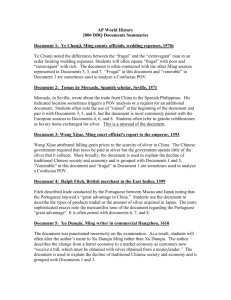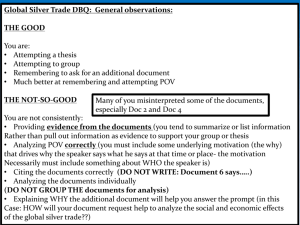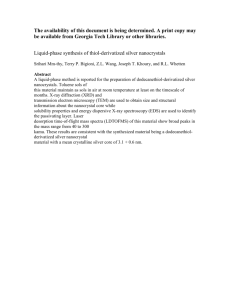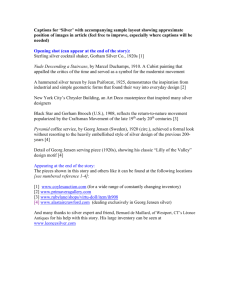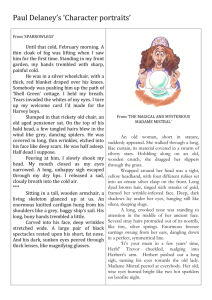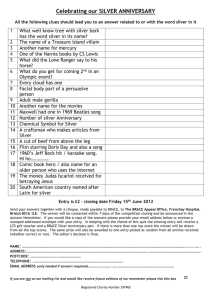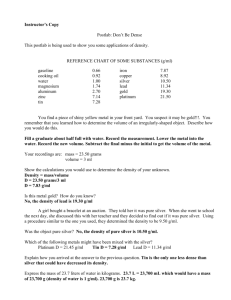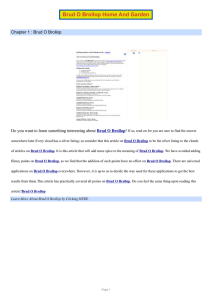Interpreting the documents and point of view in the 2006 DBQ
advertisement
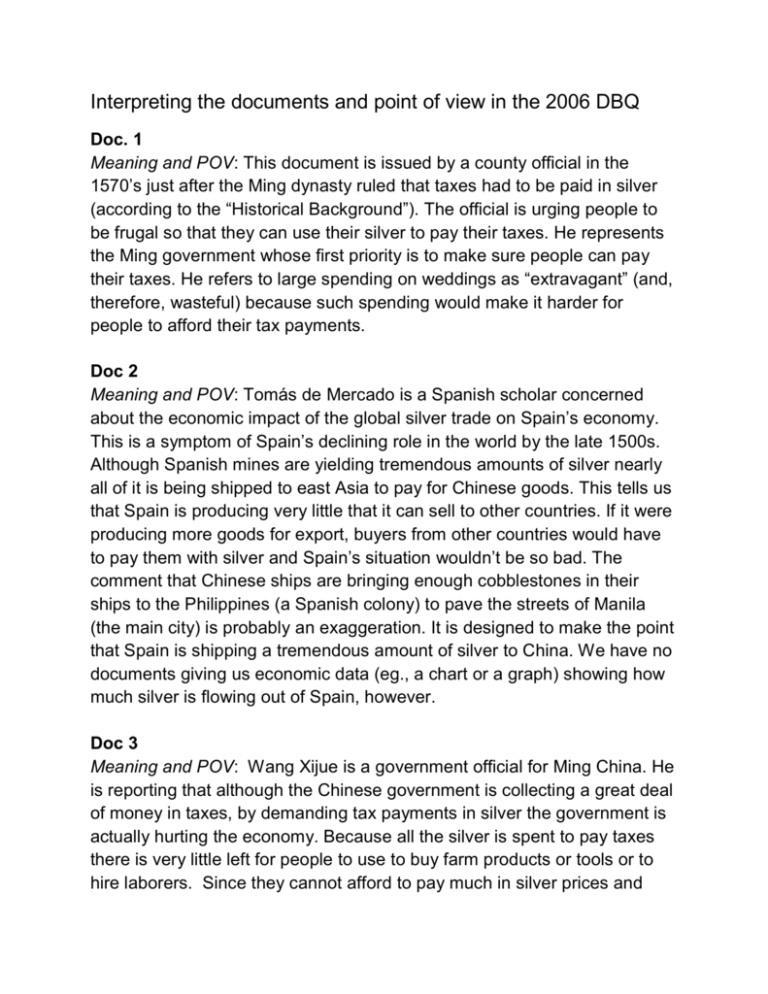
Interpreting the documents and point of view in the 2006 DBQ Doc. 1 Meaning and POV: This document is issued by a county official in the 1570’s just after the Ming dynasty ruled that taxes had to be paid in silver (according to the “Historical Background”). The official is urging people to be frugal so that they can use their silver to pay their taxes. He represents the Ming government whose first priority is to make sure people can pay their taxes. He refers to large spending on weddings as “extravagant” (and, therefore, wasteful) because such spending would make it harder for people to afford their tax payments. Doc 2 Meaning and POV: Tomás de Mercado is a Spanish scholar concerned about the economic impact of the global silver trade on Spain’s economy. This is a symptom of Spain’s declining role in the world by the late 1500s. Although Spanish mines are yielding tremendous amounts of silver nearly all of it is being shipped to east Asia to pay for Chinese goods. This tells us that Spain is producing very little that it can sell to other countries. If it were producing more goods for export, buyers from other countries would have to pay them with silver and Spain’s situation wouldn’t be so bad. The comment that Chinese ships are bringing enough cobblestones in their ships to the Philippines (a Spanish colony) to pave the streets of Manila (the main city) is probably an exaggeration. It is designed to make the point that Spain is shipping a tremendous amount of silver to China. We have no documents giving us economic data (eg., a chart or a graph) showing how much silver is flowing out of Spain, however. Doc 3 Meaning and POV: Wang Xijue is a government official for Ming China. He is reporting that although the Chinese government is collecting a great deal of money in taxes, by demanding tax payments in silver the government is actually hurting the economy. Because all the silver is spent to pay taxes there is very little left for people to use to buy farm products or tools or to hire laborers. Since they cannot afford to pay much in silver prices and wages are dropping. This is driving some farmers out of business. We don’t know how the government responded to this report. Did it adopt policies to try to put more silver back in circulation and help the agricultural economy? Document 4 Meaning and POV: Ralph Fitch is a British merchant. He is probably concerned that Britain is missing out on opportunities to profit from global trade. He is reporting that the Portuguese are making a great deal of money by trading Chinese goods with Japan. The implication is that there is a great deal of money to be made in this trade and the British could make some of it if they participated in it. We don’t have any records of how much the British were actually involved in East Asian trade in the late 16th century. Nor do we have any records showing how much the Portuguese were trading each year, or any Portuguese accounts of this trade. So it is difficult to evaluate Fitch’s thesis. Document 5 Meaning and POV: Xu Dunqiu Ming tells us that the lower classes in the Chinese city of Hangzhou are suffering because of the effects of the dominance of silver currency. They used to be able to buy things by making “in-kind” purchases (i.e., trading goods for goods). Now they must pay with silver. If they don’t have enough silver they must borrow from a “moneylender”. In all likelihood this means that many Chinese city dwellers are in debt. However, we have no documents that discuss whether or not that is true. This also shows us that even though the Ming government started requiring tax payments in silver at least 30 years earlier, and has been warned a few times about the harmful effects this policy is having on the general public, it does not seem inclined to do anything to alleviate the problem. Document 6 Meaning and POV: Antonio Vázquez de Espinosa is a Spanish priest in PotosÍ Bolivia in the early 17th century. His view is somewhat contradictory. On the one hand his description of the brutal working conditions in the mines shows some sympathy for the miners. On the other hand he is impressed with the great amount of wealth this mine is producing. He also notes that it is difficult to keep track of how much silver is produced because many Spaniards sneak out silver in order to avoid paying taxes. This document raises a question about document 2. If the silver wealth is so great why isn’t Spain benefitting more from it? Perhaps if we had a document about the kind of economy Spain had, or what (if any) efforts the Spanish monarchy made to help the economy, we could answer this question. Document 7 Meaning and POV: He Qiaoyuan works for the Ming dynasty. He is politely advising the emperor that when the emperor banned foreign trade in 1626 he put the Chinese at a disadvantage. This is because Chinese products are more valuable outside China than they are inside China. If the emperor would lift the ban it would allow Chinese merchants to make a good deal of money by selling Chinese goods outside the country. Contrast this with documents 1, 3, and 5. In those documents the government seemed unwilling to change its policies when they were harming the rural economy or urban dwellers. However, now that the emperor’s trade restriction is causing Chinese merchants to miss an opportunity to bring more silver into the country, this Ming official is concerned. Of course, we do not know if the emperor took this advice. Nor do we know why the emperor banned foreign trade in 1626. Document 8 Meaning and POV: Charles D’Avenant is an English scholar. It is important to note that this document is written in 1697, while document 4, the other English document, was written 98 years earlier. It appears that over the course of that century the British became more involved in Asian trade. We can also tell that some members of parliament want to restrict the import of Indian textiles (cloth). However, we don’t know why because there is no document from an advocate of this restriction. This document is also written 9 years after the Glorious Revolution in England. At this point merchants play a dominant role in Parliament and Parliament has more power than the monarchy. D’Avenant begins his document by reminding the Parliament that the British used to be in the spice trade but that the Dutch have taken over this trade and driven the British out. D’Avenant concedes that there are problems with the Asian textile trade. First, the imported items have little use for ordinary people in Britain. They are either purchased by the wealthy as luxury goods or re-exported to other European countries. Second, like de Mercado (doc.2) D’Avenant points out that Asian countries (probably China and India) do not seem to buy anything from the Europeans. This means that Asian products go to Europe and European silver goes to Asia. However, D’Avenant warns Parliament not to limit Indian textile imports. He says that the luxury goods have become important. Furthermore, when he says “it can never be advisable for England to quit this trade, and leave it to any other nation” he is warning that if England gets out of the textile trade that other European powers will step in and England’s global position will become weaker. In short, like Ralph Fitch (doc. 4) D’Avenant is mainly concerned with England’s emerging role as a global power.
